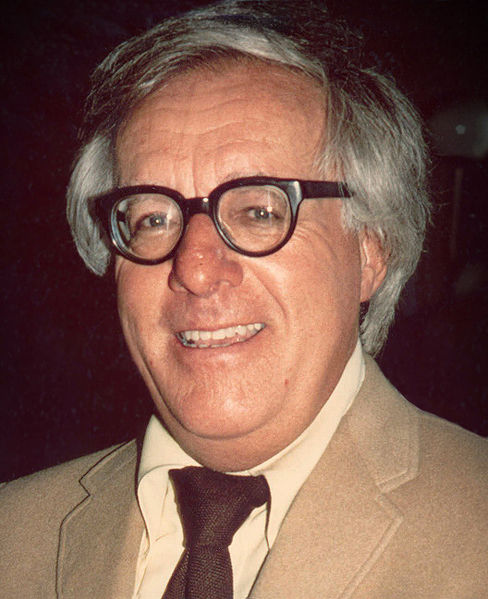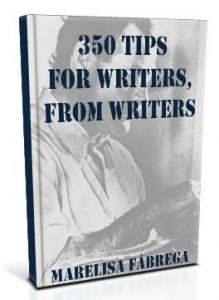 Ray Bradbury was an American fantasy, horror, science fiction, and mystery writer. Author of some 500 short stories, novels, plays and poems, his most famous works include “Fahrenheit 451”, “The Martian Chronicles”, and “Dandelion Wine”.
Ray Bradbury was an American fantasy, horror, science fiction, and mystery writer. Author of some 500 short stories, novels, plays and poems, his most famous works include “Fahrenheit 451”, “The Martian Chronicles”, and “Dandelion Wine”.
As Bradbury would say, “There’s no way to thank my own teachers, except by teaching others.” Therefore, he was always very generous with aspiring writers in sharing his writing advice. Below you’ll find nine of his tips for writers, as well as sixteen of his best quotes on writing.
Six Pieces of Writing Advice From Ray Bradbury
In 2001 Bradbury gave the keynote address at Point Loma Nazarene University’s Writer’s Symposium By the Sea. During the keynote address he offered the following six pieces of advice for writers:
1. Don’t Start Out Writing Novels. Bradbury advises not to start your writing career by trying to write a novel. He explains that the problem with setting a goal of writing a novel to begin with is that you can spend a whole year trying to write one, and it might not turn out well. After all, if you’re just starting out you haven’t learned to write yet. Beginning and intermediate writers should write short stories; that way, you can write one short story a week.
When you start writing short stories, the quality doesn’t really matter; you’re practicing your craft. At the end of the year, you’ll have 52 short stories. Bradbury adds that it’s almost impossible not to have at least one good story among those 52. Writing short stories will teach you to be constantly looking for ideas. In addition, every week you’ll be happy, because by the end of each week you’ll have something to show for your efforts.
2. Read Great Short Stories. Of course, Bradbury recommends that you read a lot of short stories by great authors. Some examples of authors whose short stories you should read are Edgar Allan Poe, Herman Melville, Edith Wharton, and Washington Irving.
3. Stuff Your Head. In addition, Bradbury recommends that for one-thousand nights, before you go to sleep, you do the following:
- Read one short story a night.
- Read one poem a night.
- Read one essay a night, from very diverse fields: politics, philosophy, religion, biology, anthropology, psychology, and so on.
At the end of the one-thousand nights you’ll be full of stuff! All this stuff will be bouncing around in your head, and you’ll be able to come up with lots of new ideas. Here’s a quote in which Bradbury emphasizes that you must read everything that you can in a variety of different fields:
“I absolutely demand of you and everyone I know that they be widely read in every damn field there is; in every religion and every art form and don’t tell me you haven’t got time! There’s plenty of time. You need all of these cross-references. You never know when your head is going to use this fuel, this food for its purposes.”
4. Get Rid of Friends Who Don’t Support You. The next thing that Bradbury recommends is that you fire all of those friends who don’t believe in you, and who make fun of your aspirations to become a writer.
- “If any girl doesn’t like what you’re doing, ‘Out of your life!'”.
- “If your friends make fun of you, “To hell with them. Out!'”
5. Live In the Library. Bradbury didn’t go to college, because he couldn’t afford to do so. However, he would go to the library religiously and read everything he could get his hands on; he indicates that he graduated from the library at the age of 28. Here’s what Bradbury has to say about libraries:
- “I spent three days a week for 10 years educating myself in the public library, and it’s better than college. People should educate themselves – you can get a complete education for no money. At the end of 10 years, I had read every book in the library and I’d written a thousand stories.”
- “You must lurk in libraries and climb the stacks like ladders to sniff books like perfumes and wear books like hats upon your crazy heads.”
6. Write With Joy. Bradbury would often say that writing is not a serious business; it’s not work. Writing is a joy, a celebration . . . you should be having fun at it. Bradbury shares that he never worked a day in his life; the joy of writing propelled him from day to day, and from year to year. Here are two of his quotes which reflect that sentiment:
- “Love is easy, and I love writing. You can’t resist love. You get an idea, someone says something, and you’re in love.”
- “Love. Fall in love and stay in love. Write only what you love, and love what you write. The key word is love. You have to get up in the morning and write something you love, something to live for.”
Three More Writing Tips From Ray Bradbury
In the 1963 documentary titled “Ray Bradbury: Story of a Writer“, Bradbury talks about his life and the creative process. (Watch the documentary while you’re having lunch, or when you have twenty-five minutes to spare. I think that you’ll enjoy it.) In the documentary, Bradbury shares several tips for writers, including the following three tips:
1. Know That It Takes a Long Time for Your Writing to Pay the Bills. It took Bradbury a long time to start making money from his writing. He says the following:
“The first year I made nothing, the second year I made nothing, the third year I made 10 dollars, the fourth year I made 40 dollars. I remember these. I got these indelibly stamped in there. The fifth year I made 80. The sixth year I made 200. The seventh year I made 800. Eighth year, 1,200. Ninth year, 2,000. Tenth year, 4,000. Eleventh year, 8,000 …
Just get a part-time job! Anything that’s halfway decent! An usher in a theater … unless you’re a mad man, you can’t make do in the art fields! You’ve gotta be inspired and mad and excited and love it more than anything else in the world! It has to be, ‘I gotta do it!’, and if you’re not that excited, you can’t win.”
2. Be a Pack Rat. Bradbury indicates that he’s kept everything that he’s ever cared about since childhood. He explains as follows:
“A writer’s past is the most important thing he has. Sometimes an object, a mask, a ticket stub, anything at all, helps me remember a whole experience, and out of that may come an idea for a story.”
3. Take Creativity Breaks. Bradbury urges writers to take breaks in order to allow ideas to percolate in the subconscious. Here’s what he says: “The time we have alone, the time we have in walking, the time we have in riding a bicycle, is the most important time for a writer. Escaping from the typewriter is part of the creative process. You have to give the subconscious time to think. Real thinking always occurs at the subconscious level.”
Sixteen Quotes on Writing by Ray Bradbury
Here are sixteen of Bradbury’s best quotes on writing:
- “Don’t think. Thinking is the enemy of creativity. It’s self-conscious, and anything self-conscious is lousy. You can’t try to do things. You simply must do things.” (In this video you can see that Bradbury had a piece of paper with the words “Don’t Think” written on it taped to the wall of his basement home office.)
- “The trouble with a lot of people who try to write is they intellectualize about it. That comes after. The intellect is given to us by God to test things once they’re done, not to worry about things ahead of time.”
- “What can we writers learn from lizards, lift from birds? In quickness is truth. The faster you blurt, the more swiftly you write, the more honest you are. In hesitation is thought. In delay comes the effort for a style, instead of leaping upon truth which is the only style worth deadfalling or tiger-trapping.”
- “I know you’ve heard it a thousand times before. But it’s true – hard work pays off. If you want to be good, you have to practice, practice, practice. If you don’t love something, then don’t do it.”
- “We are cups, constantly and quietly being filled. The trick is, knowing how to tip ourselves over and let the beautiful stuff out.”
- “I don’t need an alarm clock. My ideas wake me.”
- “Just write every day of your life. Read intensely. Then see what happens. Most of my friends who are put on that diet have very pleasant careers.”
- “You fail only if you stop writing.”
- “I always say to students, give me four pages a day, every day. That’s three or four hundred thousand words a year. Most of that will be bilge, but the rest …? It will save your life!”
- “Don’t talk about it; write.”
- “You will have to write and put away or burn a lot of material before you are comfortable in this medium. You might as well start now and get the necessary work done. For I believe that eventually quantity will make for quality. How so? Quantity gives experience. From experience alone can quality come. All arts, big and small, are the elimination of waste motion in favor of the concise declaration. The artist learns what to leave out. His greatest art will often be what he does not say, what he leaves out, his ability to state simply with clear emotion, the way he wants to go. The artist must work so hard, so long, that a brain develops and lives, all of itself, in his fingers.”
- “You can’t learn to write in college. It’s a very bad place for writers because the teachers always think they know more than you do—and they don’t. They have prejudices. They may like Henry James, but what if you don’t want to write like Henry James? They may like John Irving, for instance, who’s the bore of all time. A lot of the people whose work they’ve taught in the schools for the last thirty years, I can’t understand why people read them and why they are taught.”
- “A writer is a magnet passing through a factual world, taking what he needs.”
- “A story should be like a river, flowing and never stopping, your readers passengers on a boat whirling downstream through constantly refreshing and changing scenery.”
- “My readers must become the main character. In ‘Dial Double Zero’ they must be Tom, confronted by a miracle, trying to understand . . . the mysterious voice that keeps calling him on the telephone.”
- “The real fear isn’t rejection, but that there won’t be enough time in your life to write all the stories that you have in you.”
Conclusion
The biography released by Ray Bradbury’s publisher upon his death quoted a story in which Bradbury recounted meeting a carnival magician, Mr. Electrico, in 1932. Electrico touched the 12-year-old Bradbury with his sword and commanded, “Live forever!”
“I decided that was the greatest idea I had ever heard,” Bradbury said. “I started writing every day. I never stopped.”
 For more advice for writers, from writers on how to hone the craft of writing, get my ebook, “350 Tips For Writers, From Writers”. Just how do you go about facing an empty page, coaxing your ideas into the world of form, and steering the end result toward shore? You can start by studying the tips and advice for writers, from writers presented in this ebook.
For more advice for writers, from writers on how to hone the craft of writing, get my ebook, “350 Tips For Writers, From Writers”. Just how do you go about facing an empty page, coaxing your ideas into the world of form, and steering the end result toward shore? You can start by studying the tips and advice for writers, from writers presented in this ebook.

Related Posts:
1.119 Journal Prompts for Your Journal Jar
2.Creativity Tools: 24 Free Online Creative Thinking Tools
3.57 Tips For Writers, From Writers
4. Stuck for An Idea? Try SCAMPER
I Recommend:
1. How to Live Your Best Life – The Essential Guide for Creating and Achieving Your Life List
2. Make It Happen! A Workbook for Overcoming Procrastination and Getting the Right Things Done
3. How to Be More Creative – A Handbook for Alchemists
Did you enjoy this article? Subscribe to “Daring to Live Fully” by clicking here and get free updates.

 Marelisa Fabrega is a lawyer and entrepreneur. She holds a Bachelor of Science in Business Administration from Georgetown University in Washington, D.C., as well as a Juris Doctor from the Georgetown University Law Center. You can learn more about her
Marelisa Fabrega is a lawyer and entrepreneur. She holds a Bachelor of Science in Business Administration from Georgetown University in Washington, D.C., as well as a Juris Doctor from the Georgetown University Law Center. You can learn more about her 






Comments on this entry are closed.
Hi Marelisa,
Long time! I just noticed you’ve been to Paris. When was that? Next time tell me so we can have a chat & a beer 🙂
Charles
Marelisa,
Fabulous! I loved Ray Bradbury reading his stories as a teenager is how I was inspired to become a writer myself.
Thank you for all the effort and research you put into this article. You are appreciated.
xoxo,
Angela
Hi Charles: It was many, many years ago. I definitely want to go back, although it’s not in my current plans. I’ll keep you posted. 🙂
Hi Angela: He lived his life like life should be lived: with purpose and gusto. Glad you enjoyed the post. 🙂
Marelisa:
I had to let go of the people in my life who did not support me or only brought me down. It is not always easy letting go of people, expecially if they are people that we love. Sometimes though, we have to do what is best for ourselves.
I started out writing anything and everything that I could think about. Recently, I started writing short stories, but I could not have written a book from the start, no way! It is possible now because I have had lots of practice.
Practice makes perfect.
At the end of the day, when you write short stories it is nice to have something completed to feel happy about.
Best Wishes,
William Veasley
Hi William: Thank you for sharing your personal experience. It is difficult to let go of certain people, but we can’t allow others to kill our dreams. I agree with you: practice makes perfect.
Marelisa: I also believe that hardwork beats talent so I have been trying to work my hardest, but anyways, I do not want to be a “crab in the bucket”.
I was re-reading part of your post and I can connect with point #1 because I am not making money, but really, money is the furthest thing from my mind or even what I want.